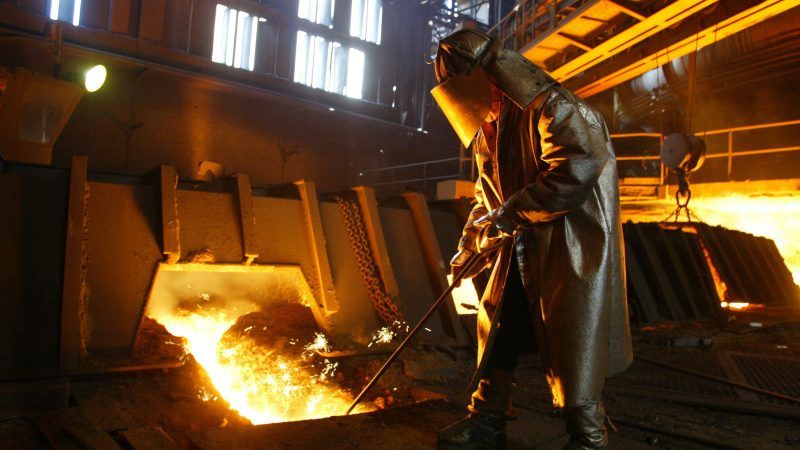Protectionism Ruined U.S. Steel
Another round of federal intervention to prevent its sale makes no sense.

Few people, and even fewer senators, would blink an eye at the news that the 690th most valuable company in the United States was being sold.
Unless, as is the case, that company happened to be named "U.S. Steel."
In response to last month's news that U.S. Steel would be purchased by Japan-based Nippon Steel, a bipartisan group of senators—including Sherrod Brown (D–Ohio), John Fetterman (D–Penn.), Josh Hawley (R–Mo.), Marco Rubio (R–Fla.), and J.D. Vance (R–Ohio)—have condemned the decision. The three Republicans have gone a step further by formally asking the Biden administration to block the deal because it represents a supposed threat to national security. As a political matter, the reactions to the sale of U.S. Steel have served as a nice reminder that the impulse to intervene in the private affairs of publicly traded companies runs across both major parties.
As a matter of economic policy, however, those senators have completely missed the point. More government intervention is not going to save U.S. Steel. Indeed, decades of protectionist policies seem to have contributed to its downfall.
"Arguably, US Steel has been a disappointment since the day it was formed," writes Brian Potter, a senior infrastructure fellow at the Institute for Progress, in his Construction Physics Substack newsletter. "The company's large size made it unwieldy to manage, and it was late to every major advance in steelmaking technology of the last 100 years, from continuous rolling to the basic oxygen furnace to the minimill….As far as I can tell, no major steelmaking technology over the last century came out of US Steel."
Though U.S. Steel enjoyed global dominance in the aftermath of World War II, in no small part because the war had wrecked large portions of Europe's and Japan's industrial bases, it was already on the decline by the 1960s and early 1970s. After Nippon—the company now poised to buy out what remains of U.S. Steel—surpassed it as the world's largest steel company in 1971, U.S. Steel responded "not by trying to improve their operations, but by demanding government protection from 'unfair' foreign trade practices," writes Potter.
Thus began a 50-plus-year effort by the federal government to prop up U.S. Steel. Those interventions have taken many forms, including "hundreds of import restrictions; tens of billions of dollars in state, local and federal subsidies and bailouts; exemptions from environmental regulations; special 'Buy American' rules just for integrated steelmakers like U.S. Steel; and federal pension benefit guarantees," wrote Scott Lincicome, vice president of the Cato Institute's Herbert A. Stiefel Center for Trade Policy Studies, in a 2021 rundown on how protectionism had failed American steel companies and their employees. Even before President Donald Trump slapped 25 percent tariffs on nearly all imported steel, about half of all anti-dumping tariffs imposed by the federal government were aimed at various types of foreign-made steel, according to Lincicome.
What has all that government aid done for U.S. Steel? Today, the company makes about one-third as much steel as it did in the mid-1950s and employs about 10 percent as many people as it did during its heyday. U.S. Steel was dropped from the S&P 500 in 2014 and ranked as the 690th most valuable company based in the United States before the Nippon purchase was announced. As Potter notes, that means U.S. Steel ranks behind the Texas Roadhouse steakhouse restaurant chain and employs around the same number of people as Chewy, the online pet care delivery service.
Would the sale of either of those companies attract the attention of senators or be condemned as a risk to American national security? Of course not.
The difference between Texas Roadhouse and U.S. Steel mostly comes down to branding and lobbying.
"One of the smartest things the founders of U.S. Steel did was put 'U.S.' in the firm's name," suggests Dominic Pino in a post at National Review. While it is certainly not the only example out there, the branding of U.S. Steel (a fully private company, don't forget) "makes it sound like it's a bad thing for America if it's purchased by a company from another country," Pino concludes.
As for lobbying, it is no secret that U.S. Steel has long maintained a powerful presence in Washington. That goes all the way back to the company's more successful early days, when it used its sheer size in the market "to bully other steelmakers and extract money from consumers," writes Potter. "When this stopped working, it used its political influence to prevent consumers from buying low-cost foreign steel. Improving the efficiency of its operations was something it did as a last resort when left with no other options."
Like people, companies get better at the things they work to improve on. Long ago, U.S. Steel decided that it didn't need to innovate to compete more successfully in a global marketplace if it could instead extract benefits from the political process. Ironically, that same political process could now be the thing that prevents U.S. Steel from being acquired by a more successful firm.
The idea that national security is threatened by Nippon's purchase of U.S. Steel is utterly silly. And the associated idea that the federal government has failed to adequately cradle American steelmakers from foreign competition is simply false. Protectionism failed U.S. Steel by cushioning the company when it needed to innovate, and another round of federal intervention to prevent its sale makes no sense.


Show Comments (63)